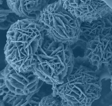 |
prof. Krystyna Jackowska |
|
I. MaterialS: Synthesis, Properties, Applications ( 30 h/semester, 2ECTS) Conducting polymers : Types of conducting polymers,
mechanisms of conductivity, doping methods. Methods of synthesis and
mechanisms of polymerization. Application of electrochemical and
spectroscopic methods in investigations of polymerization and properties of
conducting polymers. Determination of structure and morphology by using
microscopic methods. Applications of conducting polymers. Conducting polymer
nanostructures: synthesis, properties and applications. Hybrid systems (metallic,
semiconductor nanoparticles-biomaterials) synthesis, properties. (
prof. Krystyna Jackowska
)
Selected aspects of modern applied electrochemistry. Corrosion : stability of metals, Pourbaix diagrams, Evans diagrams, mechanisms of corrosion, type of corrosion, methods of investigations, inhibitors, passivation, other methods of protection. Electrocatalysis: differences between simple electrochemical reactions and electrocatalytic reactions, examples of electrocatalytic reactions and their significance, types of catalyst, application of catalysts in fuel cells. Bioelectrocatalysis. Electrodeposition: mechanisms of nucleation and growth 2DI, 2DP,3DI,3DP, UP-deposition, factors influencing electrodeposition, method of investigation, catalytic properties of upd deposits. Electrochemistry and photoelectrochemistry of semiconductors: differences between metal and semiconductor electrodes (SC), kinetics at SC electrode, factors influencing photocurrent, photopotential, corrosion, photocorrosion of SC electrode , protection against photocorrosion, photovoltaic cells, photoelectrolytic cell, solar cells - water decomposition. Electrochemical devices. Nanoelectrochemistry in nanotechnology.
ALUMNI/STUDENTS Justyna Widera, Ph.D. in 2000 Anna Frydrychewicz, Ph.D. in
2003 Magdalena Tagowska, Ph.D. in 2005 Aleksander Bieguński, Ph.D. in 2007 19 graduates with MSc., (1993-2008) Last M.Sc. topics : 1. Electrochemical preparation of conducting polymer and copolymer containing carboxylic groups. The study of redox properties. 2. Synthesis and characterization of hybrid structures based on cadmium selenide and polymer 3. Electrodeposition of cadmium on glassy carbon and polyindole electrodes. |
||||||||||||||||